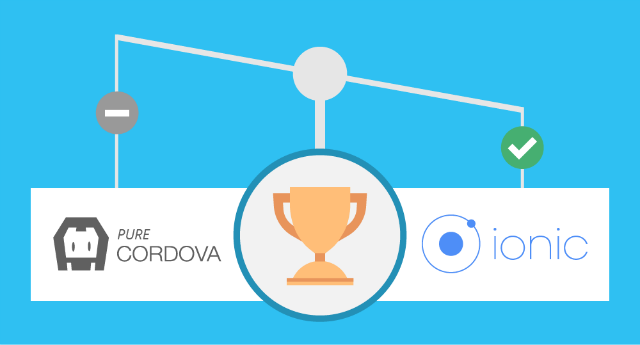Saying that one particular type of mobile development (native, cross-platform or hybrid) is the only right way to create mobile apps is similar to saying that only one programming language is the most suitable for coding. As project requirements are always unique, while tools and technologies have different qualities and, what’s more, constantly evolving, nothing can be just black and white.
That’s why, even knowing that hybrid development has a large scope for improvement, we at ScienceSoft keep an eye on its progress and are delighted to see what the Ionic framework can offer developers today.

What’s Ionic?
Used for hybrid development in HTML, CSS, and JavaScript, Ionic allows to quickly create powerful and beautifully designed mobile apps that can be deployed through Cordova. Ionic is built on top of AngularJS and, apart from helping you build a solid app structure with it, uses Angular directives for all its components. As a result, component implementation gets simplified to several lines in HTML.
How Does Ionic improve Cordova Development?
Ionic wraps all Cordova commands and lets you work with any Cordova plugin or additional package. Along with it, you have the following three advantages over Cordova-only development.
1. Slick UI and UX
Ionic is a perfect fit for the easy and fast development of a simple but trendy design with everything you may need already included in the framework kit. At your disposal, there are dozens of templates, over 80 mixins, 700+ standard icons and lots of built-in UI elements such as headers, footer bars, buttons, grid elements and more. This is definitely a better start than the empty app screen you see in Cordova.
You also get all the UI components: lists, navigation, action sheet, pop over, “pull to refresh” as well as other features that you can implement in your app by writing two or three lines of code. What’s more, the code commands are relatively simple and can be easily recognized by developers. You definitely would know what “ion-infinite-scroll” or “ion-refresher” is.
But in case you stumble upon something unclear, Ionic is ready to help you out with its official documentation and active support community.
2. A More Convenient Development Process
The ‘serve’ feature is present in both Ionic and Cordova and allows developers to access an HTTP-server to test the application code in a desktop browser. However, working with ‘cordova-serve’ is rather inconvenient as it doesn’t let you launch the test from your initial www-folder and forces you to create an app build first.
Things are different with ‘ion-serve’. You can edit your code in the app folder and immediately see it altered since the app prototype tab is refreshed automatically after every single change. A similar effect can be achieved with Grunt in Cordova, but unlike the out-of-the-box Ionic feature, it’s far from being perfect.
3. Higher Performance of the Final Product
Compared to Cordova-built apps, the Ionic code creates more powerful and higher performing applications. With jqLite, a fraction of jQuery, it takes a minimal DOM manipulation, and native hardware acceleration is enough. Ionic optimizes animation effects and tunes up the GPU work to achieve the best processing time. Hence, those milliseconds of tap delay that are present in all hybrid apps (due to the bridged gap between the app and the native SDK) are cut in half, and the application gets to perform more vigorously.
Conclusion
Ionic may be referred to as a mere Cordova wrapper, but it actually brings hybrid development to the next level. Besides being a useful tool for creating a beautiful design, it also eases the development process and powers up the application’s performance. If you want to know more about app development on Ionic, feel free to contact ScienceSoft’s mobile application developers.
About the Author
Vadzim Belski is Head of Web Development Department at ScienceSoft, a software development and consulting company headquartered in McKinney, Texas. With over 13 years of experience, he has been taking part in web projects with a primary focus on large-scale IT engagements, such as Viber (an instant messaging and VoIP app with 700 mln active users), Globus VPN Browser and others.







































































Send Comment:
9 Comments:
More than a year ago
Thank you for your comparison! It's not really often developers compare these 2 frameworks. I lately see a lot of articles about Ionic vs Flutter (e.g. or Cordova vs Flutter (e.g. so I mostly know pros and cons from this perspective. According to these comparisons, Cordova surpasses Ionic in terms of testing due to using LiveReload, which you don't mention actually. What do you think about it? Doesn't it make Cordova any better competitor for Ionic?
More than a year ago
Hi, tell me How to assign a form to multiple organizations?
More than a year ago
A great piece that sheds much needed light on emerging technology like Ionic App Development and its impact on business as there are many new details you posted here. Sometimes it is not so easy to build a Top Ionic App without custom knowledge; here you need proper development skills and experience. However, the details you mention here would be very much helpful for the beginner. Here is yet another top-notch solution provider “X-Byte Enterprise Solutions” who render feasible and credible solutions to global clients by our top Ionic app development service
Know more: Top Ionic App Development company in USA
More than a year ago
What a joke! Ionic doesn't even allow developers to CENTER an element on a page!
More than a year ago
Well, cordova can use framework 7 which i preffered more than ionic UI. You said ionic built applications has a higher performance than cordova ones. How do you measure. Can you prove your statement
More than a year ago
Well Ionic is one of the popular technology for building light weight mobile applications amongst all the latest technologies!
More than a year ago
What do you think of ReactJS?
More than a year ago
Simply awesome, Vadzim! Based on requirement of cross-platform mobile application development Ionic can help a developer to develop outstanding mobile app in quick time. Great read!
More than a year ago
If we want to extend an application across more than one platform, without having to re-implement it with each platform's language and tool set we can use this thing right ???